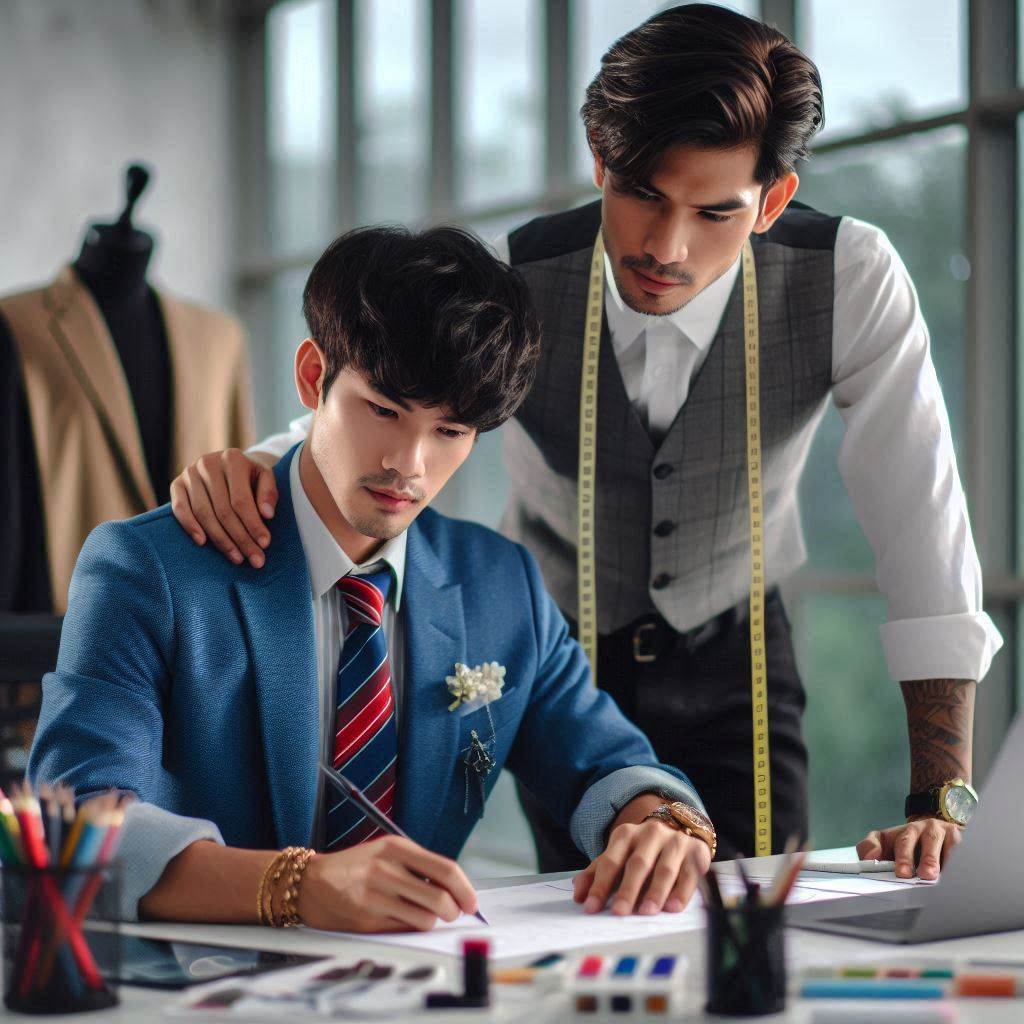Introduction
In the fast-paced world of fashion, finding the right mentor can accelerate your career.
A fashion design mentor offers guidance, feedback, and connections that can help you grow as a designer.
They provide insider knowledge, helping you navigate the competitive industry with confidence.
Mentorship is vital for aspiring fashion designers.
The fashion industry thrives on creativity, but it also demands a strong understanding of trends, business, and production.
A mentor can help you sharpen your skills while learning the intricacies of the business.
They offer insights into designing for different audiences, managing production, and building your brand.
With their guidance, you can avoid common mistakes and focus on long-term success.
Finding a mentor in fashion design takes effort, but the benefits are worth it.
The first step is to research experienced designers whose work you admire.
Look for professionals with a proven track record who align with your aesthetic and goals.
Once you’ve identified potential mentors, attend fashion events or industry conferences where they might be present.
This is a great way to meet them in person and establish a connection.
Another way to find a mentor is through fashion internships or design schools.
These environments are rich in networking opportunities and allow you to engage with seasoned professionals.
Building relationships during internships can often lead to valuable mentorships.
Being proactive in these spaces can open doors to meaningful connections.
Research Potential Mentors
Finding the right fashion design mentor starts with thorough research.
Focus on identifying designers whose work resonates with you and reflects the direction you want your career to take.
Look for fashion designers whose work you admire
Begin by identifying fashion designers whose work you genuinely admire.
Their designs should align with your creative vision and aspirations.
This admiration creates a natural connection that can help you form a meaningful relationship.
Research their portfolios, past collections, and overall design philosophy to ensure a strong match.
Follow them on social media to learn more about their style and aesthetic
Social media offers valuable insights into a designer‘s style and day-to-day work.
Follow potential mentors on platforms like Instagram or LinkedIn to get a closer look at their creative process.
Pay attention to the types of content they post, including new collections, collaborations, and inspirations.
Engage with their posts by leaving thoughtful comments or asking questions to start building rapport.
Attend fashion events and networking opportunities to meet potential mentors in person
While social media is a great start, meeting potential mentors face-to-face can make a lasting impression.
Attend fashion events such as runway shows, exhibitions, or industry mixers where designers are present.
Introduce yourself, express your admiration for their work, and have a genuine conversation about their designs.
Personal interactions at events can open doors to mentorships that might not happen through virtual means.
Workshops and industry panels also provide intimate settings where you can connect with designers more directly.
In these environments, you‘ll have the opportunity for one-on-one discussions, which can lead to a stronger connection.
By following these steps‘researching designers, engaging with them online, and attending fashion events‘you‘ll be better positioned to find a mentor who aligns with your goals and aspirations.
The key is to remain patient, persistent, and genuinely interested in the work of those you admire.
With the right approach, you‘ll open the door to valuable mentorship opportunities in the fashion industry.
Reach Out to Potential Mentors
Reaching out to a potential mentor is a crucial step in securing a fashion design mentorship.
You need to approach this process with professionalism and respect for their time.
Send a Polite and Professional Email Expressing Your Interest in Their Work
Start by crafting a polite and professional email.
This first message will shape their impression of you, so make sure it reflects your seriousness and genuine interest in their work.
Why You Admire Their Designs and Why You Would Like Them to Be Your Mentor
Begin by expressing your admiration for their designs.
Fashion designers appreciate knowing that their work inspires others.
Highlight specific pieces or collections that have resonated with you.
Explain how their design style aligns with your creative aspirations.
This personalized approach shows that you have done your research and are not sending a generic message.
After establishing a connection through your admiration, make your request clear.
Explain why you are seeking their mentorship and how it could benefit your career.
Be specific about why you believe they are the right person to guide you.
Mention any shared design philosophies or creative interests that you hope to explore further under their guidance.
Be Clear About Your Expectations and What You Hope to Gain from the Mentorship
Next, outline your expectations for the mentorship.
It is important to be transparent about what you hope to gain.
Whether it is industry knowledge, creative guidance, or networking opportunities, clarity will help the mentor understand your goals.
This will also help them determine if they are the right fit for you.
In addition to setting expectations for yourself, consider what you can offer in return.
Mentorships are often two-way relationships.
Can you assist them with any projects or bring fresh perspectives to their work? Offering your support shows that you value their time and are willing to contribute to their success.
Keep your email concise and respectful of their time.
Avoid overwhelming them with too much information.
Provide enough detail to spark their interest, but keep the focus on how their mentorship can impact your development as a designer.
At the end of your email, thank them for considering your request, and let them know you look forward to their response.
Finally, be patient.
Fashion designers are often busy, so give them time to respond.
If you do not hear back after a couple of weeks, a polite follow-up is appropriate.
However, avoid being overly persistent.
By crafting a well-thought-out message and showing genuine interest in their work, you increase your chances of securing a meaningful mentorship.
Read: Freelance vs. In-House Costume Design Jobs
Show Your Dedication
Demonstrate Your Commitment to Fashion Design by Sharing Your Portfolio or Previous Work
To secure a fashion design mentorship, you need to prove your dedication to the craft.
Start by presenting your portfolio or past work, showing that you have invested time and effort in honing your skills.
A well-curated portfolio can demonstrate your unique vision, creativity, and technical abilities, setting you apart as someone truly passionate about fashion design.
Be sure to include pieces that reflect your style, attention to detail, and any original work that showcases your growth as a designer.
This will prove to potential mentors that you‘re serious about your future in fashion.
Any Relevant Experience or Skills That Make You a Good Candidate for Mentorship
Relevant experience and skills are equally important.
Highlight any internships, courses, or fashion-related projects you‘ve been involved in.
Even if you haven‘t worked in a high-profile role, show how you‘ve applied your design knowledge in real-world settings.
Mention experiences that challenged you and helped you grow as a designer.
This not only showcases your skills but also your adaptability and problem-solving abilities.
Fashion mentors look for mentees who are resourceful, dedicated, and willing to learn from their experiences.
Express Your Willingness to Learn and Grow Under Their Guidance
Equally critical is expressing your eagerness to learn and grow under mentorship.
Make it clear that you view mentorship as a valuable opportunity to evolve, not just a stepping stone to fame or success.
Demonstrate your humility and openness to constructive criticism, as these qualities are essential in the fast-paced and competitive fashion industry.
Communicating your willingness to put in the effort and continuously improve will show mentors that you‘re ready to fully engage in the learning process.
Be proactive in expressing your commitment to the mentorship relationship.
Tell your potential mentor that you are prepared to work hard, whether it‘s through attending industry events, learning new techniques, or collaborating on projects.
Demonstrating that you‘re serious about growth will build confidence in your ability to succeed.
Your dedication and willingness to improve under their guidance can create a strong foundation for a successful mentorship.
Basically, proving your dedication to fashion design is essential to securing a mentorship.
Showcasing your work, highlighting relevant skills and experiences, and expressing your passion for growth can make you an attractive candidate.
A mentor wants to invest their time in someone who is serious about the craft and committed to their own development.
Make sure you convey that you‘re ready to take your design skills to the next level with their guidance.
Read: Networking Events for Costume Designers
Establish Clear Goals
Work with Your Potential Mentor to Set Specific and Achievable Goals for the Mentorship
When seeking fashion design mentorship, start by discussing your aspirations and objectives with your mentor.
Define specific areas in your work where you seek improvement.
Are you looking to enhance your technical skills, or do you want to refine your design concepts? Articulate these areas clearly.
Collaborate with your mentor to set achievable goals, ensuring that these goals are realistic and attainable within the given timeframe.
What Areas of Your Work You Want to Improve and How You Can Work Together to Achieve Them
Identify which aspects of your work need improvement.
Whether it‘s mastering new design software or developing a unique style, be specific about your goals.
Work with your mentor to create a plan that addresses these areas.
Breaking down your larger objectives into smaller, manageable tasks makes it easier to focus and achieve progress.
A clear plan helps you and your mentor stay aligned and work efficiently.
Create a Timeline for Your Goals and Check in Regularly to Track Your Progress
Outline a detailed timeline for your goals, specifying when you plan to achieve each milestone.
This might involve setting deadlines for completing certain projects or mastering new techniques.
A timeline keeps you organized and provides a clear path forward.
Regularly schedule check-ins with your mentor to discuss your progress and any challenges you encounter.
Use these meetings to evaluate your advancements and make necessary adjustments to your strategies.
Setting clear goals not only helps you stay on track but also maximizes the effectiveness of the mentorship.
It allows both you and your mentor to focus on what‘s most important and ensures steady progress toward your objectives.
Remember, goal-setting is dynamic.
Be open to refining your goals as you progress based on your mentor‘s feedback and your evolving needs.
In summary, establishing clear goals is crucial for a successful mentorship.
Define specific areas for improvement, collaborate with your mentor to set achievable targets, and create a timeline for these goals.
Regular check-ins will help you track your progress and make adjustments as needed.
This structured approach ensures that you make the most of your mentorship experience and achieve your fashion design aspirations.
Read: Building a Portfolio for Costume Design

Be Open to Feedback
Mentorship Is a Two-Way Street
To thrive under a mentor‘s guidance, you must embrace feedback.
Mentorship is a two-way relationship, where both parties contribute.
Your mentor is sharing their time and expertise, so it‘s crucial to stay open-minded and receptive.
Even the most seasoned designers rely on feedback to refine their craft, and so should you.
Use Feedback as a Learning Opportunity
When your mentor offers constructive criticism, don‘t take it personally.
Instead, view it as an opportunity for growth.
A mentor‘s feedback reflects their experience in the fashion industry, offering insights you can‘t find in books or classes.
Each piece of advice is a chance to elevate your skills and approach.
By staying open to their suggestions, you demonstrate maturity and a willingness to improve.
Transform Your Career Today
Unlock a personalized career strategy that drives real results. Get tailored advice and a roadmap designed just for you.
Start NowApply Feedback to Improve Your Skills
Use feedback as a tool to sharpen your design skills.
When your mentor critiques your work, don‘t just listen‘take action.
Reflect on their comments and think about how you can incorporate the lessons into your future designs.
The most successful fashion designers didn‘t reach the top alone; they continually refined their craft based on others‘ input.
Your mentor‘s feedback can be the key to transforming your raw ideas into polished, marketable creations.
Show Gratitude for Your Mentor‘s Time and Expertise
Showing gratitude for your mentor‘s time and expertise is equally important.
Acknowledge their advice, even if it challenges your perspective.
Remember, your mentor doesn‘t owe you their time; they offer it because they believe in your potential.
Expressing appreciation for their insights strengthens your relationship and makes it more fulfilling for both sides.
Build Trust and Grow as a Designer
When you‘re open to feedback and show gratitude, you build trust with your mentor.
This trust will encourage them to invest more time in your development.
As they see your progress, they‘ll feel more confident in offering deeper, more meaningful guidance.
Over time, you‘ll evolve not only as a designer but also as a professional who can accept and apply constructive criticism effectively.
Read: Famous Costume Designers in Hollywood
Network and Seek Support
Join Fashion Design Groups or Associations to Connect with Other Designers and Mentors
Networking is a vital step in securing a fashion design mentorship.
By connecting with industry professionals, you increase your chances of finding a mentor.
One effective way to build your network is by joining fashion design groups or associations.
These organizations provide a platform to meet other designers and potential mentors.
Groups like the Council of Fashion Designers of America (CFDA) or local design associations offer networking events, industry insights, and opportunities to showcase your work.
Attend Workshops, Seminars, and Fashion Shows to Expand Your Network and Learn from Industry Professionals
Attending workshops, seminars, and fashion shows is another excellent way to expand your network.
These events bring together established designers, industry experts, and aspiring fashion professionals.
By attending, you immerse yourself in a community that values learning and collaboration.
At these events, you can strike up conversations with mentors, gain valuable advice, and increase your visibility in the industry.
Many professionals are eager to share their experiences, making workshops and seminars a fertile ground for finding mentors.
Seek Guidance from Career Counselors or Mentors Outside of the Fashion Industry for Additional Support and Advice
In addition to industry-specific events, don’t hesitate to seek guidance from mentors outside of the fashion industry.
Career counselors, business mentors, or professionals in creative fields can offer fresh perspectives and advice.
Their outside experience can help you develop transferable skills, such as leadership, time management, and communication.
These skills are essential for building a successful career in fashion design.
When networking, focus on building genuine relationships.
People are more likely to support someone they feel a connection with.
Ask thoughtful questions, show interest in their work, and stay in touch after meeting.
Follow up with an email or a message to express your appreciation for their time.
Staying in touch with your network keeps the door open for future opportunities and support.
Another great way to find mentors is by actively participating in online fashion communities.
Platforms like LinkedIn, Instagram, and Behance can connect you with designers and industry leaders worldwide.
By sharing your work and engaging with other designers’ content, you can build an online presence that attracts mentors and collaborators.
Lastly, don’t underestimate the value of peer mentorship.
Often, your peers can provide advice, share opportunities, and offer encouragement.
By supporting others, you create a mutually beneficial relationship that strengthens your career.
Surround yourself with ambitious and creative individuals who push you to grow.
By actively networking, attending events, and seeking guidance from both within and outside the fashion industry, you’ll increase your chances of securing valuable mentorship.
This support can help you thrive in your career and open doors to future opportunities.
Stay Persistent and Patient
Understand That Finding the Right Mentor May Take Time and Effort
Finding a fashion design mentor requires time and effort.
It‘s crucial to remain persistent and patient throughout this process.
Begin by recognizing that securing the right mentor may not happen immediately.
Fashion design is a competitive field, and the search for a mentor can be challenging.
Don‘t Get Discouraged by Rejection or Unanswered Messages
Don‘t be discouraged by initial setbacks.
Rejections and unanswered messages are common and should not deter you.
Keep in mind that mentors are often busy professionals with demanding schedules.
An unanswered message doesn‘t necessarily reflect your worth or potential.
It simply means you need to stay resilient.
Keep Pursuing Opportunities for Mentorship and Stay Focused on Your Goals
Persistence is key when seeking mentorship.
Regularly follow up on your initial inquiries.
A polite reminder can sometimes lead to a response when initial messages go unnoticed.
Continue to research and identify potential mentors who align with your career goals and aspirations.
Networking is a valuable tool in this process.
Attend industry events, fashion shows, and networking functions.
Engaging with professionals in these settings can open doors to potential mentorship opportunities.
Make sure to approach potential mentors with a clear, concise introduction of yourself and your goals.
Stay focused on your goals throughout the journey.
Clear objectives will help you stay motivated and direct your efforts effectively.
Define what you hope to achieve through mentorship and use this as your driving force.
Keep exploring various avenues for mentorship.
Look for opportunities both online and offline.
Join fashion design forums, social media groups, and professional organizations related to your field.
Engaging in these platforms can connect you with mentors who share your interests and career aspirations.
Embrace Challenges and Stay Committed to Finding Your Mentor
Remember, every successful designer has faced challenges and rejections on their journey.
Your persistence in seeking mentorship is a testament to your dedication and passion for fashion design.
Use setbacks as learning experiences and stay committed to your pursuit.
By staying patient and persistent, you increase your chances of finding a mentor who will guide you toward your career goals.
Continue to reach out, follow up, and engage with the fashion design community.
Your dedication will eventually pay off, leading you to the mentorship you need to advance your career.
Basically, the journey to finding a fashion design mentor may be long and challenging, but persistence and patience are crucial.
Embrace the process, learn from each step, and stay focused on your goals.
Your commitment will ultimately lead you to the guidance and support you need to succeed in the fashion design industry.
Learn More: UX/UI Design for E-commerce: Best Practices
Conclusion
Finding and securing a fashion design mentor involves a series of strategic steps.
First, thoroughly research potential mentors who align with your career goals and design style.
Look for industry leaders whose work inspires you and whose values match your own.
Connect with them through professional networks, social media platforms, or industry events.
Once you‘ve identified potential mentors, approach them with a clear, concise pitch.
Articulate why you admire their work and how their guidance can benefit your growth.
Be respectful of their time and be prepared to demonstrate your dedication to your craft.
Follow up with a personalized thank-you note or email after initial contact.
Show appreciation for any advice or feedback they provide.
Building a professional relationship requires ongoing effort, so maintain regular communication and share your progress.
Mentorship is crucial for advancing your career in the fashion industry.
A mentor offers invaluable insights, industry connections, and practical advice that can accelerate your professional development.
Their experience can help you navigate challenges, refine your skills, and enhance your design portfolio.
[E-Books for Sale]
The Big Book of 500 High-Paying Jobs in America: Unlock Your Earning Potential
$19.99 • 500 High-Paying Jobs • 330 pages
Explore 500 high-paying jobs in America and learn how to boost your career, earn more, and achieve success!
See All 500 High-Paying Jobs of this E-Book
1001 Professions Without a Degree: High-Paying American Jobs You Can Start Now
$19.99 • 1001 Professions Without a Degree • 174 pages
Discover 1001 high-paying jobs without a degree! Unlock career tips, skills, and success strategies for just $19.99!




